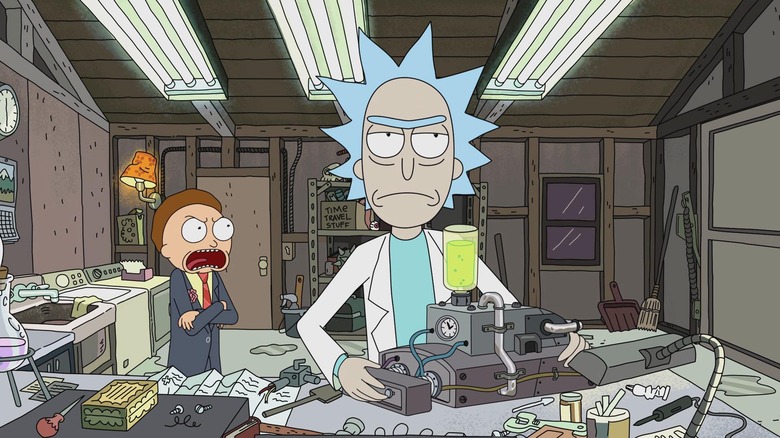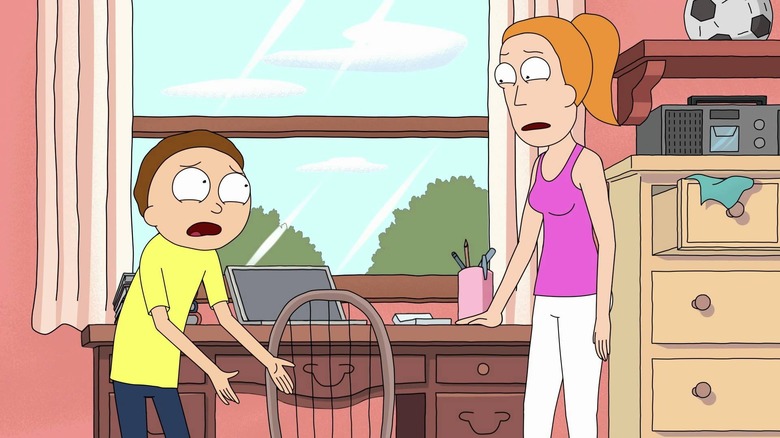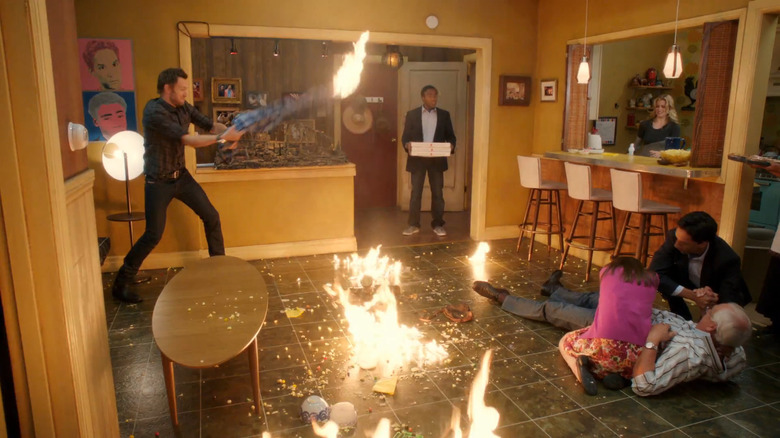Rick And Morty's Writers Weren't Afraid To Let Their Multiverse 'Jump The Shark'
One thing that's basically ensured "Rick and Morty" can go on forever is the show's use of the multiverse. Once Rick and Morty bail on their reality in season 1, it's been clear that there will nearly always be a reset button available for the writers. If Rick ever screws up so bad that the whole world is destroyed, all he has to do is move to a nearly-identical reality where his alternate self just so happens to die around that point (more common than you'd think), and take his alternate self's place.
In a recent roundtable interview attended by /Film's Ethan Anderton, Dan Harmon recalled discussing this with his writing staff when working on season 1. "Let's not be afraid of jumping this shark. Let's have him move to a new earth in episode two or something." They ended up doing it in episode 6's "Rick Potion #9" after Rick accidentally causes the apocalypse. It's implied to have happened at least one more time in season 3's "Morty's Mind Blowers," when Morty discovers that squirrels are evil masterminds at the center of multiple global conspiracies.
It's a storytelling device that allows the show to maintain its mostly episodic narrative, but it's also one that sort of kills the stakes. If Rick has the power to jump ship from any given reality the moment things get too hard, why should he (or we) even care about what's going on at any given moment? Nothing matters except for how it affects our specific version of Rick, but episodes showing us the other realities (or the other decoys) keep reminding us that our version of him isn't all that special. If the show ever quietly switched realities for an episode, we probably wouldn't notice.
Keeping us invested anyway
The writers' response to this problem was simply to lean into it. The characters struggle with the knowledge that they are just one of the infinite versions of themselves, that they aren't special or unique, and that nothing really matters if they think about it from the grand scheme of things. And much like "Everything Everywhere All at Once" would later do, the answer to how to deal with this is to simply embrace the life you've got, with however much time you have. "Nobody exists on purpose, nobody belongs anywhere, everybody's gonna die," Morty tells Summer in the middle of her season 1 existential crisis. "Come watch TV."
And as the seasons go on, it becomes clear that Rick has in fact grown emotionally attached to this version of his family. He tries to give the impression that he wants to protect them simply because moving to a new reality is a hassle, but as he involves the rest of his family more in his adventures, he does begrudgingly seem to have grown fond of this version of them. "EEAaO" ends with Evelyn realizing that even though it doesn't make any real, logical sense, she still cares deeply about the people in her reality. Rick's been going through the same basic character arc, just with a lot more burping involved.
It's in this way that "Rick and Morty" has taken a potentially jumping-the-shark plot device and instead tackled it early on, turning it into one of the defining aspects of the series. "Why bother caring if nothing matters?" is a question the show's been raising since "Rick Potion #9." The answer is that you just will. Life can make you care no matter how much you know you shouldn't.
Getting in on the concept early
With Marvel going all in on the multiverse throughout the past year, "Rick and Morty" deserves some props for diving into the concept before all the movie studios concluded it was box office gold. No, the showrunners didn't invent the idea or anything, but they proved it wasn't something that would necessarily kill the audience's investment in the characters.
Even before "Rick and Morty," Harmon's previous show "Community" had multiple episodes exploring the multiverse. Most notable was season 3's "Remedial Chaos Theory," which explores all the parallel universes that were created from a single roll of the dice. "There's an added layer of pride there," Harmon explained, "because Chris McKenna, who co-wrote that amazing Spider-Man movie ["No Way Home"], he was a mastermind behind the timeline episode."
Many of the people Harmon's worked with early in their careers — from the Russo Brothers, to McKenna, to "Rick and Morty" staff writers Jeff Loveness and Jessica Gao — have since moved on to Marvel, and you can definitely see that effect on the MCU. It seems like a clear example of the real world being influenced to an extent by Harmon's creative decisions. "It's just so cool to watch our single universe move forward in that way," he said. "I just love that everybody's now able to access this idea of an infinite multiverse. It feels great."


